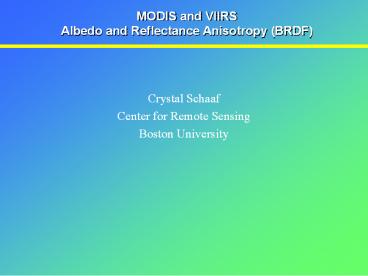MODIS and VIIRS Albedo and Reflectance Anisotropy (BRDF)
Title:
MODIS and VIIRS Albedo and Reflectance Anisotropy (BRDF)
Description:
... Anisotropy (BRDF) ... are available to characterize the surface anisotropy ... Albedo and Reflectance Anisotropy (BRDF) Long term NPP Land ... –
Number of Views:99
Avg rating:3.0/5.0
Title: MODIS and VIIRS Albedo and Reflectance Anisotropy (BRDF)
1
MODIS and VIIRSAlbedo and Reflectance Anisotropy
(BRDF)
- Crystal Schaaf
- Center for Remote Sensing
- Boston University
2
MODIS and VIIRSAlbedo and Reflectance Anisotropy
(BRDF)
- NPP/NPOESS EDR calls for a (cloud-free) shortwave
albedo with the atmospheric state at time of
overpass - Broadband instantaneous albedos only no
spectral albedos - The NGST VIIRS land albedo algorithm has been
delivered utilizing two retrieval approaches - Dark Pixel Surface Albedo (DPSA) based on MODIS
heritage - Bright Pixel Surface Albedo (BPSA) based on a
direct-estimate top-of-atmosphere method
3
MODIS and VIIRSAlbedo and Reflectance Anisotropy
(BRDF)
- Heritage MODIS implementation provides periodic
BRDF and Albedo retrievals over land. - A BRDF is retrieved for each pixel where
sufficiently high quality and well distributed
cloud-free observations are available to
characterize the surface anisotropy - Albedos (integrals of the BRDF) are intrinsic
surface quantities and are governed by the
surface cover, vegetation state, and structure
4
MODIS and VIIRSAlbedo and Reflectance Anisotropy
(BRDF)
- Current MODIS product uses both Terra and Aqua
to obtain periodic retrievals of BRDF - At 500m every 8 days (based on a 16-day window)
- Daily albedos are produced by coupling these
periodic BRDFs with instantaneous observations - BRDF provides a priori description of the surface
character - Instantaneous observation provides measure of
surface and atmospheric state. - Note BRDFs are also used by the community to
correct directional observations to a common view
geometery - Nadir BRDF-Adjusted Reflectance (NBAR)
5
MODIS and VIIRSAlbedo and Reflectance Anisotropy
(BRDF)
- Long term NPP Land Science Team concerns
- Broadband instantaneous albedo is not sufficient
- Most modelers are interested in spectral albedos
- No access to underlying spectral BRDF IP
- NGST implemented two algorithms (DPSA and BPSA)
for land with no guidance on relative quality - Original scheme BPSA for pure snow and DPSA
elsewhere - Ocean Albedo algorithm implemented but Sea Ice
not addressed
6
MODIS and VIIRSAlbedo and Reflectance Anisotropy
(BRDF)
- Recent Disappointing Developments
- Still no access to spectral albedos and BRDF IP
- Specifications relaxed
- albedo produced at 1km but evaluated at 4km
- Sea Ice albedo only within 0.3
- Sea Ice Albedo algorithm implemented
- direct-estimate top-of-atmosphere method
- BPSA has been declared primary algorithm over all
surfaces
7
MODIS and VIIRSAlbedo and Reflectance Anisotropy
(BRDF)
- MODIS Product Evaluation and Validation
- V005 reprocessed product
- 500m tiled, every 8 days (16 day window)
- 30arc sec, 0.05degree global climate model grids
(CMG) - Gap filled BRDF (continuation of the
collaboration with the Atmospheres Team) - 30arc sec, 0.05degree CMGs
- 500m tiled (in collaboration with the NACP
effort) - Validation of the MODIS BRDFs with POLDER
- Extensive Validation over the ARM Southern Great
Plains site - CLASIC field campaign
- tower albedometers, Cloud Absorption Radiometer
(CAR) - Scale tower/CAR/MODIS with high res imagery/land
cover - ARCTAS field campaign
8
MODIS and VIIRSAlbedo and Reflectance Anisotropy
(BRDF)
- Gap-filled Global BRDF Product
5-year composite maps of the MODIS BRDF
(Isotropic Parameter, P0) at Band1 using high
quality full inversions only (Left) before
gap-filling and (Right) after gap-filling in
January (Top) and July (Bottom). Histogram
stretch 0-388.
9
MODIS and VIIRSAlbedo and Reflectance Anisotropy
(BRDF)
- Validation with POLDER-3/PARASOL
- Selection of sites for a variety of land covers
Nov 2005-Oct 2006.
10
MODIS and VIIRSAlbedo and Reflectance Anisotropy
(BRDF)
- Validation with POLDER-3/PARASOL
- Selection of sites for a variety of land covers
Nov 2005-Oct 2006.
11
MODIS and VIIRSAlbedo and Reflectance Anisotropy
(BRDF)
- CLASIC field campaign over the ARM Southern Great
Plains site - Tower data
- CAR
J-31 CAR Flight Track Map
250-500m 1km 0.05degree































